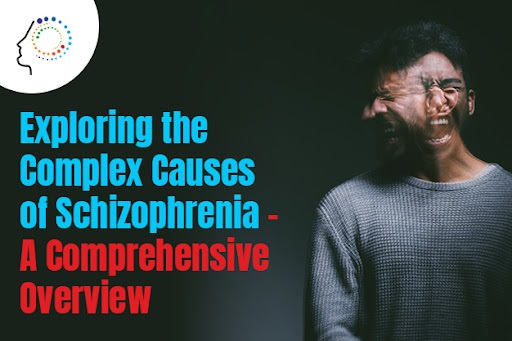Millions of individuals worldwide, including a sizable proportion in India, have schizophrenia, a complicated and crippling mental condition. There may be various symptoms, including hallucinations, delusions, disordered thinking, and social disengagement. Multiple factors such as genetic, environmental, and neurological are involved in developing schizophrenia, which has multiple etiology.
We shall explore the various causes of schizophrenia in this blog –
Genetics
Schizophrenia is a complicated mental illness with a significant genetic component. Numerous studies have demonstrated that genetics is a crucial factor in the onset and expression of this crippling disorder. Studies have repeatedly shown that those with a family history of schizophrenia are much more likely to experience the condition themselves. It is one of the main causes of schizophrenia.
The genetic underpinnings of schizophrenia have mainly been uncovered through twin and family research. Compared to fraternal twins, who only share 50% of their genetic makeup, identical twins, who share 100% of their genetic makeup, have a greater concordance rate for schizophrenia. This discrepancy strongly implies that hereditary factors influence the chance of getting schizophrenia.
Also Read : Schizophrenia Meaning, Symptoms, Cause, and Treatment
Schizophrenia treatments, when related to genetics, involve a personalized approach that considers an individual’s genetic profile. Specific genetic differences that may affect therapy response can be identified by genetic testing, which can also help with medication selection. For instance, specific genetic variants can affect how antipsychotic drugs are metabolized, affecting their efficacy and potential side effects. Understanding the genetic components of schizophrenia will help improve treatment plans and drug adherence, eventually improving outcomes for those with the condition.
Brain Structure
Changes in brain structure and function are seen in those with schizophrenia. The pathophysiology of schizophrenia is influenced by neurobiological factors such as neurotransmitter dysregulation, aberrant brain connection, and abnormal neurodevelopment.
Structural Changes in the Brain
Numerous studies on the relationship between schizophrenia and brain structural alterations have been conducted. Magnetic resonance imaging (MRI) and other neuroimaging methods have shed light on the structural changes in the brain seen in those with the condition.
Schizophrenia patients’ brain volumes and cortical thickness are regularly found to be different from healthy controls’ in MRI investigations. The prefrontal cortex and hippocampus are the two brain regions most affected by these structural alterations and hence an underlying cause of schizophrenia. Cognitive impairments seen in people with schizophrenia have been linked to decreased gray matter volume and cortical thickness.
Also Read : Schizophrenia Treatment, Causes, Risk Factors And All To Know
Neurotransmitters
The chemical messengers in the brain, also known as neurotransmitters, are essential for the signaling between neurons. Schizophrenia’s pathogenesis has long been linked to dysregulation of neurotransmitter systems.
Dopamine, a neurotransmitter involved in motivation and reward processing, has drawn a lot of interest in studies on schizophrenia. According to the dopamine theory, pleasant symptoms like hallucinations and delusions are caused by increased dopamine activity in some brain areas, especially the mesolimbic pathway.
Recent studies also point to the complicated neurobiology of schizophrenia as including different neurotransmitter systems, including serotonin and acetylcholine. Imbalances in these systems are also one of the causes of schizophrenia, with many symptoms and cognitive deficiencies.
Neurotransmitter abnormalities are routinely treated with antipsychotic drugs to reduce symptoms. Schizophrenia treatments include psychosocial therapies, like cognitive-behavioral therapy and family therapy, which assist people in coping with the disorder’s difficulties and enhance social functioning. By targeting the neurological underpinnings of the condition, treatment aims to minimize symptoms, avoid relapse, and increase general well-being.
Pregnancy
A woman’s pregnancy is a crucial time in her life, and new research indicates that it may affect her risk of getting schizophrenia in later years. Pregnancy may play a part in the genesis of schizophrenia, according to research examining the relationship between pregnancy-related variables and the onset of schizophrenia.
Also Read : Schizophrenia: What leads to schizophrenia? Can schizophrenia be cured?
Maternal Infections
One of the possible causes of schizophrenia has been found as prenatal infection exposure. Maternal infections, especially in the first and second trimesters of pregnancy, may increase the likelihood that a child will develop schizophrenia. Flu, rubella, toxoplasmosis, and herpes simplex infections have all been linked to an increased risk. These infections can set off an inflammatory reaction in the developing fetal brain, resulting in aberrant neurodevelopment and a higher risk of schizophrenia.
Obstetric Complications
An elevated risk of schizophrenia has been linked to complications during pregnancy or delivery. An increased chance of developing schizophrenia has been associated with maternal gestational diabetes, preeclampsia, premature birth, low birth weight, and hypoxia following delivery. These issues may impair embryonic brain growth and result in long-term neurobiological alterations that aid in the disorder’s development.
It’s essential to strike a careful balance while managing symptoms and ensuring the mother and the growing fetus are safe when taking schizophrenia treatments during pregnancy. Antipsychotic drugs are frequently prescribed to treat psychotic symptoms, but using them while pregnancy needs to be carefully monitored and adjusted with the help of medical specialists. Managing schizophrenia during pregnancy requires regular prenatal care, counseling, and support.
Childhood Trauma
Child abuse, negligence, and other traumatic experiences have been identified as potential risk factors for the emergence of schizophrenia. According to research, traumatic exposure during crucial stages of neurodevelopment may be a factor in the beginning and development of this complicated mental condition.
Numerous studies have found a connection between childhood traumatic experiences and a higher chance of acquiring schizophrenia in later life. Compared to people who did not suffer childhood trauma may be less likely to develop schizophrenia. Childhood trauma includes emotional negligence, physical or sexual abuse, and regular exposure to domestic violence. These results imply that the disease may partly develop due to adverse childhood experiences. And maybe a cause of schizophrenia.
One suggested mechanism used in schizophrenia treatment includes the disruption of the hypothalamic-pituitary-adrenal (HPA) axis, a component of the stress response system. Chronic stress response activation brought on by childhood trauma can result in abnormally high levels of stress hormones like cortisol. Long-term exposure to high cortisol levels may interfere with normal brain development, especially in areas linked to stress management and emotion processing, raising the risk of causes of schizophrenia.
Conclusion
The development and manifestation of schizophrenia are influenced by the interaction of genetic, environmental, neurobiological, and social variables. It is crucial to comprehend the causes of schizophrenia to develop efficient early diagnosis, prevention, and treatment methods. We can better understand the complicated causes of schizophrenia and seek to improve the lives of those afflicted by this complex disorder.
If you need top-class treatments for schizophrenia or anxiety, consult Dr Anil Yadav, who is the best NeuroPsychiatrist in Delhi. He has years of experience and is known for providing exceptional patient care. He is a certified psychiatrist and is successfully treating and managing mental illnesses.




Recent Comments